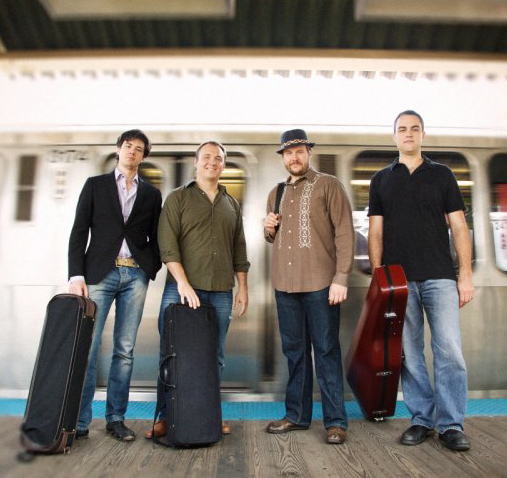Spektral Quartet closes first season with impassioned playing and a mesmerizing new work

With well-established ensembles ranging from the Pacifica Quartet to eighth blackbird, Chicago doesn’t lack for fine, locally based chamber music groups.
But there’s always room for more top talent, and the Spektral Quartet, which wrapped up its debut season Friday night at Nichols Concert Hall in Evanston, is a welcome new arrival. Violinists Aurelien Fort Pederzoli and J. Austin Wulliman, violist Doyle Armbrust and cellist Russell Rolen are offering a winning combination of superb playing and a fresh approach to repertoire choice and concert staging.
Listening to their tightly woven, passionate performance of Beethoven’s Op. 18, No. 6 quartet and Bartok’s Fourth String Quartet Friday night, it was difficult to believe that the players have been working together for a scant 18 months. They performed both pieces with a sense of freedom and flexibility that usually comes only after long years of collaboration. Their tone is rich and warm, and with Pederzoli as first violinist, the fast movements of the Beethoven quartet were fleet and brimming with effervescent good cheer.
In Bartok’s fierce Fourth String Quartet with Wulliman in the first violin chair, the Spektral’s rich tone took on darker hues and steely sinew. They fully explored the eerie strangeness of Bartok’s musical language, playing with a combination of spontaneity and polish that helped us savor its shadowy melodies, tense rhythms and brooding harmonies.
The evening’s new work, Chambers, a three-movement piece commissioned from Chicago-based composer Marcos Balter, proved a mesmerizing plunge into icy musical depths. Seated far away from one another, the quartet played their raw-edged, sustained, slow-moving musical lines as if they were calling to each other across vast, Arctic distances. At times, they teamed up on two-note phrases, each playing a single note, the melody swaying back and forth like the quiet, patient squeak of a playground swing. This is a gorgeous piece, well worth hearing again.
There were a few misfires in the concert’s non-musical elements. The typewritten letter that served as a program was a nicely breezy summary of Spektral’s first season and the evening’s format. But the signatures were first names only. Nowhere was there a list of the players’ full names, the instruments they played or their backgrounds. Without that basic information, newcomers were left feeling like outsiders at a not-very-welcoming party.
And while the idea of recording comments about Beethoven and Bartok by two eminent performers — Arnold Steinhardt, first violinist of the Guarneri Quartet, and violist Richard Blum, a long-time Pro Arte Quartet member — was a good one. But the tape’s poor quality made them difficult to understand. Also, the onstage debate between Wulliman and Armbrust about the influence of Beethoven’s growing deafness on the La Malinconia movement of Op. 18, No. 6 seemed stilted.
However, giving the audience a glimpse of increasingly desperate e-mail exchanges between Balter and the ensemble about the new piece was a brilliant stroke. Read aloud as they unfurled across a large onstage screen, the typed messages became hilarious. Worried about getting the score in time for proper rehearsal, Wulliman worked to keep his cool. Balter tried to reassure as deadlines came and went. Performers and composers have been exchanging those kinds of missives since the days of quill pens and probably well before. Bravo to the Spektral Quartet and Balter for lifting the veil on the often nerve-wracking process of creation.
Posted in Performances




